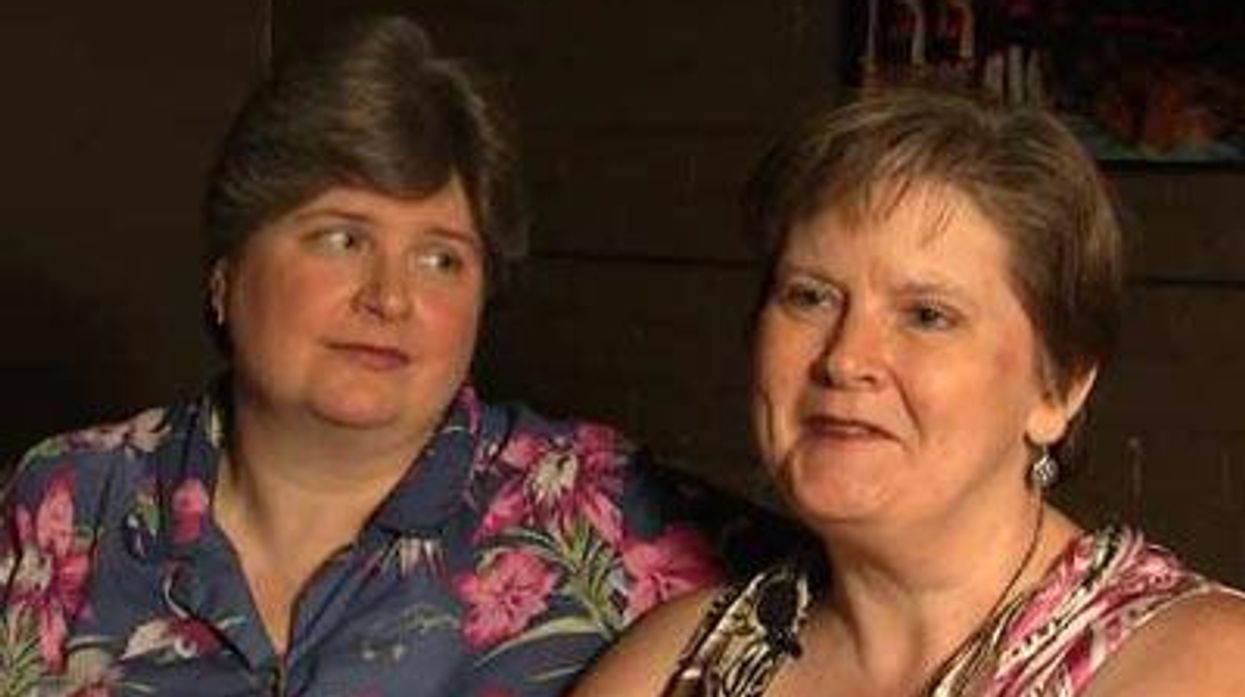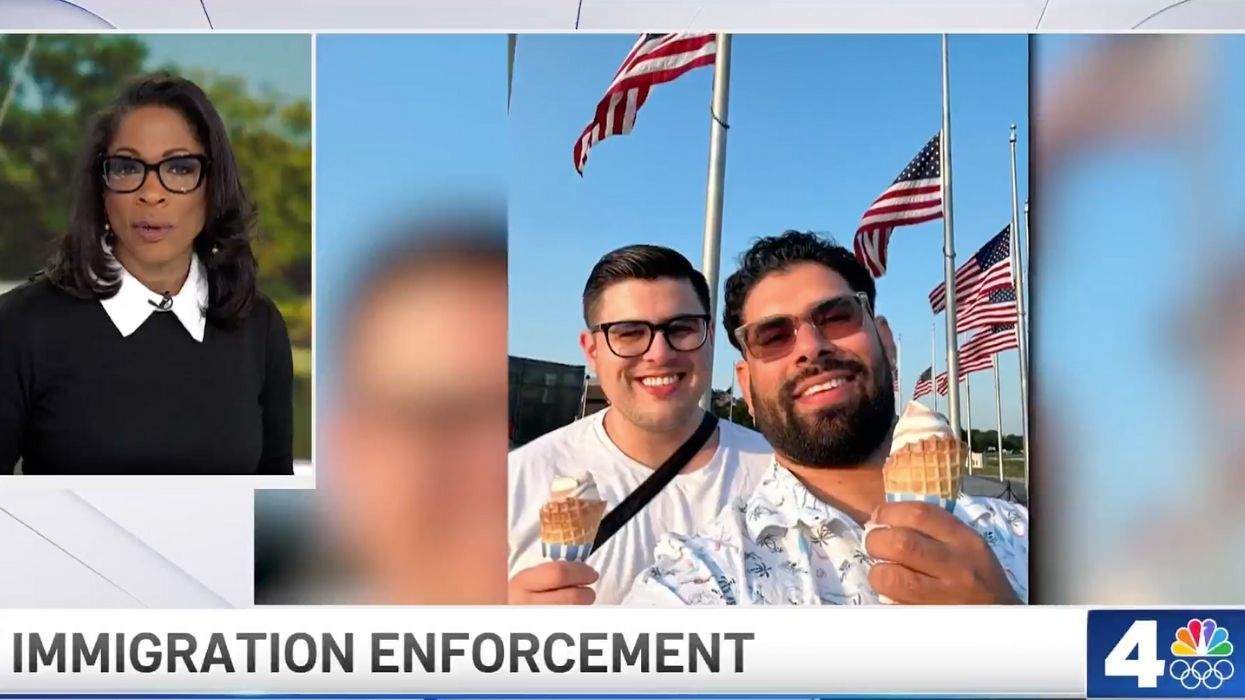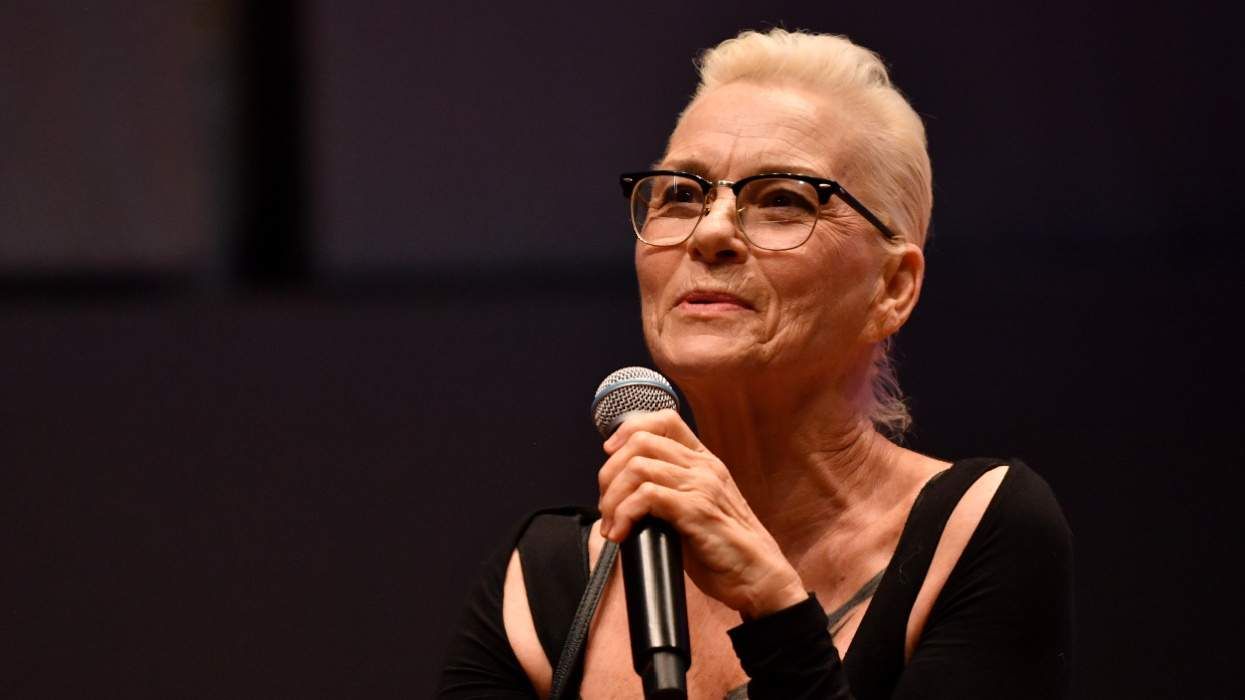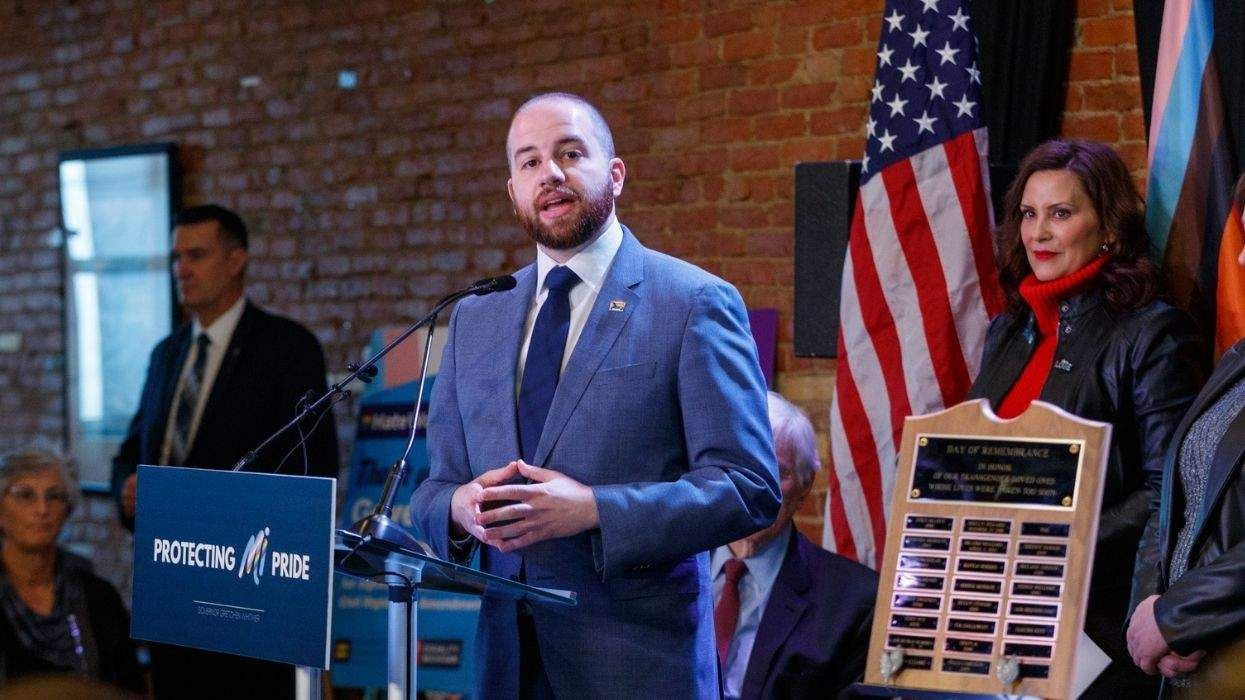I can't even begin to tell you how many times I have been told that Oklahoma, a red state where I've lived with my husband since 2007, would be the last state to legalize same-sex marriage. So you can only imagine my joy when Sharon Baldwin and Mary Bishop, an Oklahoma couple living in my city of Broken Arrow, won their federal lawsuit challenging Oklahoma's ban on their marriage in January.
Their case prevailed again at the 10th U.S. Circuit Court of Appeals on April 17, and it is among the several marriage cases the Supreme Court is considering whether to take this term (the court is moving slowly but could possibly announce whether it will hear the case on Monday).
I had the pleasure of sitting down with Mary, 52, and Sharon, 45, numerous times this year to discuss their feelings on the case, and when they are not working as newspaper editors (Mary is an assistant editor at the Tulsa World; Sharon resigned from the World in May after 21 years to write a book about the lawsuit) or rehabilitating orphaned or injured raccoons (their Facebook pics of them are awesome!), their case to legalize same-sex marriage in Oklahoma has become a full-time job they are happy to take on.
Eric Himan: Thank you both so much for taking the time to talk with me about yourselves and the case. Let me start by asking: How long have you been together?
Mary: 17 years last November --
Sharon: So 17 years, 10 months, eight days... I don't know the hours. [Laughs]
How long have you both lived in Oklahoma?
Mary: All our lives, with the exception of the one year I spent in Jonesboro, Ark. as a graduate student at Arkansas State University.
Sharon: I have lived in Tulsa and later Broken Arrow my whole life except for three years in Norman while attending the University of Oklahoma.
What made you decide to get married?
Mary: When we knew our love was right -- was forever -- and that our relationship was solid, we knew that we wanted to provide for each other in the event of one of our deaths. People who are married don't even have to think about these things, but without the benefit of marriage, we knew that we had to take steps to ensure the surviving partner's economic well-being. We had an attorney draw up estate documents for us -- a living trust, power of attorney, health-care proxy, etc. But we knew that these things still didn't give us all the protections marriage carries with it automatically.
When did you know it was time to do something about it?
Mary: It came into the realm of possibility in our minds when same-sex couples in Massachusetts became able to legally marry in 2004. We are all citizens of the United States of America. People in one state shouldn't have more civil rights than people in any other state. When the attorney who handled our estate documents approached us to say he'd met another attorney who was interested in taking on a marriage-equality case and to ask if we'd be interested in being plaintiffs, we said absolutely. We were motivated to insist on equal rights for ourselves and other gay and lesbian couples because we know that we are not second-class citizens, although that's how we were being treated. There is nothing inherently wrong with being gay. We are as fully human as anyone else, so we should not be treated as less than other citizens of this nation and residents of this state.
I believe that certain things had to fall into place before we could get to the point where we could pursue marriage equality and win. First of all, the medical and psychological communities agreed that homosexuality is not a mental illness but instead is a natural variation on the human sexuality scale. Second, the Supreme Court determined that same-gender couples' consensual sexual relations are not crimes. Next, more and more gay and lesbian people have come out of the closet and let their families, co-workers, neighbors, fellow church members, etc., know them as their true selves. And then, once the door to marriage equality was opened in the courts in some states, it became clear that all states and the United States must recognize same-sex couples' relationships, just as they do straight couples' relationships. We were not willing to sit back and wait for someone else to take this on.
Also, we knew that if Oklahomans were ever to have marriage equality, it would have to be gained through the courts. We knew that the Oklahoma Legislature would never do it, and in 2004, 76-plus percent of Oklahoma voters put the ban on same-sex marriage into the state constitution. We and our co-plaintiffs were working with our lawyers before the Legislature put that amendment on the ballot, but when the election was scheduled and it became apparent how the vote would go, we told our attorneys to have the lawsuit ready to file the day after the election, and that's what they did.
How much of your lives has the suit taken over?
Sharon: Mary and I have joked that until this year, we could go entire weeks without even remembering the lawsuit. But when we got our ruling from a Tulsa federal judge in January, the pace picked up dramatically. We had so many interviews with reporters! I'll bet we averaged two interviews a week for a while. Things slowed down after a bit, and it felt kind of like a part-time job, but then the frenetic pace returned in April when the federal appeals court affirmed our ruling, and it has only grown crazier with each passing day as we get closer and closer to perhaps going before the Supreme Court. There is so much to do! Not just media interviews, although there are plenty of those, but communication with the lawyers, reading all of the filings in our case as well as other cases, and reading everything we can in the press and online to keep up with what's going on regarding marriage-equality around the country. And it is time-consuming, but we also want to make sure that people know we're not resentful about that. We chose to put ourselves in that position. And also, we probably don't have to do as much as we do, but we recognize that this isn't just about us. We need to be able to speak about our case and the relevant law because we want people to be invested in this. We feel some "happy obligation" to educate and to share this experience with other people. And we've learned a lot ourselves. We've learned that on some level, being morally right doesn't guarantee success in the courts. Jurisprudence is really about lawyers doing their jobs well; with luck, better than the other guy. Of course being right matters, but being all the right in the world won't necessarily get you anywhere. We have been beyond fortunate to find ourselves with incredible lawyers who have put together a phenomenal case, who are working for free and who always seem to have time for our questions, no matter how silly they might be.
Were there organizations that you thought could help but you didn't get their support in the end?
Mary: We didn't go into this expecting help from any organizations. The surprising thing to us was that very shortly after the lawsuit was filed, the national gay rights groups actually asked us to drop our DOMA challenge. They said we would lose at the Supreme Court and would set the movement back 20 years -- and that if by chance we won, that would only make Congress more determined to pass the Federal Marriage Amendment, which would put the ban on gay marriage into the United States Constitution. We refused to drop the DOMA challenge from our lawsuit, because without federal recognition and state-to-state recognition, one state's marriage would mean nothing. We knew that even if we won the right to marry in Oklahoma but had no federal recognition, we wouldn't even be able to file our income taxes as a married couple because Oklahoma law requires that the federal and state taxes be filed using the same marital status. Also, we believed even at that point -- 2004 -- that the Federal Marriage Amendment would never be ratified by enough states to enact it, so that argument seemed bogus to us.
About five years ago, our original attorney had to drop many of her cases, including ours, because of health issues. We were in need of a new attorney and contacted one of the leading national marriage equality groups to ask about referrals or that group's possible interest in taking our case. We were told no, that as long as we kept the DOMA challenge, the group wouldn't help us.
About that same time, our current lead attorney, Don Holladay, contacted our previous attorney to see if he could help. We four plaintiffs met with Don and his wife, Kay Holladay, the co-founder of PFLAG's Norman, Okla., chapter, and fell in love with them. We signed on with Don and haven't looked back. He and his associate, James Warner III, are brilliant, and no one could have handled the early stages of our case any better. Don added OU law professor Joseph Thai as a third attorney for the 10th Circuit appeals phase, and we have added Stanford University Supreme Court Litigation Clinic Director Jeffrey Fisher to our legal team for the Supreme Court phase.) We are paying expenses, but the lawyers are working pro bono.
Sharon: We think of them as our Dream Team. They're just the best lawyers - the best people - in the world.
Mary: Also about that time, Oklahomans for Equality, a statewide gay-advocacy group based in Tulsa, took on our case as a cause it supports. It has honored the four of us plaintiffs as community heroes and Pride parade grand marshals, has publicized our case, has raised money for our legal fund and has stood behind us for years. OkEq continues to be a great ally of ours.
Are you confident that the Supreme Court will take on one of the same-sex marriage cases this term and if so, what sets your case apart from the others that have been fought in other states?
Sharon: I believe that they will take a same-sex marriage case this term. Justice Ginsburg ruffled some feathers... when she said there is no rush for the high court to weigh in on the issue, but for starters, she's only one justice, and it only takes four of the nine to decide to take a case. Secondly. I don't think she was saying they won't take a case, just that maybe there's no urgency. And we disagree with that, of course, but again, no one has said no yet. The justices at this point will have seven cases from five states to consider: three cases out of Virginia, and one each from OK, Utah, Indiana, and Wisconsin. The big thing that sets our case apart from the others is that it deals only with the "celebration" or "merits" issue - that is, can states ban same-sex couples from marrying within their borders. The other cases delve into the "recognition" aspect of the issue, which is to say whether states must honor marriages performed in other jurisdictions. Some observers say that our case's simplicity makes it an attractive case for the justices. Others disagree. But most observers expect the high court to take more than one of the cases and combine them. We'll just have to see. It's important to remember that no one knows what the court will do until it does it.
Do you think your case will be the one they choose?
Sharon: I think it is critical that they take some case. Selfishly, I want it to be our case. It would be disingenuous to say anything else. We wouldn't have gone this far if we intended to step aside at the summit and let someone else finish the job. But if they don't pick us, we, of course, will get behind whomever they do pick. The executive director of our local LGBT organization, Toby Jenkins of Oklahomans for Equality, continually tells us, "You've already changed the history books! You've already changed the laws! You've already been successful." We know that, and we appreciate his saying so, but we can't deny that we hope to go to Washington.
There were another couple of plaintiffs in your lawsuit initially, Sue Barton and Gay Phillips. What are their roles in the case?
Mary: Our part of the lawsuit challenges Oklahoma's refusal to allow us to get married here. Sue and Gay's part had challenged both the federal government's and the state's refusal to recognize their legal marriage from another state. Judge Terence Kern of the Northern District of Oklahoma dismissed their claim on DOMA Section 3, saying the Supreme Court's Windsor ruling made it a moot point. He also dismissed their claim regarding DOMA Section 2 -- the part that says one state doesn't have to recognize the marriage of any same-sex couple from another jurisdiction -- and their claim about Oklahoma's lack of recognition. The 10th Circuit agreed with him, and the only part of the case that's going forward is our part.
Sharon: But as far as we're concerned, Gay and Sue are as much a part of the lawsuit today as they have always been. We have become like family with them over the last decade. We respect them, we enjoy them, and we love them. They are still involved in strategy about the case and are very much still a part of every aspect of it.
And one last question and the best for last: When -- and I said when! -- same-sex marriage is legal federally, how do you envision your wedding?
Mary: We've already had a commitment ceremony that was recognized by a church, so we want this wedding to be strictly civil. We had thought for years that we'd just go to a judge's chambers with only our closest friends and family, but so many people have said they want to be there that we've decided we'll have to have the ceremony in a very public place, such as the courthouse plaza or the steps of the Federal Building in downtown Tulsa, where Judge Kern's office is. The great outdoors can hold as many people as want to come! Then we want to have a big reception somewhere nice and invite the many people who have been so supportive of us throughout our lawsuit.
ERIC HIMAN is an out musician. EricHiman.com















Charlie Kirk DID say stoning gay people was the 'perfect law' — and these other heinous quotes
These are some of his worst comments about LGBTQ+ people made by Charlie Kirk.